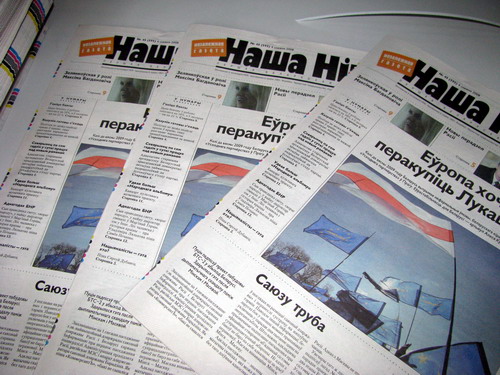 According to the Belarusian Minister of Information Aleh Praliaskouski, left, the 11 April bomb attack in the Minsk metro that claimed the lives of 14 people divided the mass-media in “decent” and “indecent” rather than in “state-owned” and “independent”.
According to the Belarusian Minister of Information Aleh Praliaskouski, left, the 11 April bomb attack in the Minsk metro that claimed the lives of 14 people divided the mass-media in “decent” and “indecent” rather than in “state-owned” and “independent”.
“The fact of them helping a number of politicians to dance on the bones after the terrorist act gives them no chance of forgiveness,” – said the minister.
Along with the official version, the independent media published opinions of some opposition politicians about the reasons behind the blast, something interpreted by the authorities as a sacrilege. However, state officials and state media were not prevented from interpreting the events in their one way.
Praliaskouski shared that the Ministry of Information registered a claim to the Supreme Economic Court concerning the cessation of “Nasha Niva” and “Narodnaya Volya” newspapers for inappropriate coverage on the terrorist attack in the Minsk metro. The Minister underlined that this is “a right of the Ministry and my personal position”.
Dead-end road
Nevertheless, the chief editors of the newspapers that are under threat of closure, do not lose optimism.
 The editor-in-chief of “Nasha Niva” Andrei Skurko, left, shared his opinion on the situation with “Euroradio”: “I think we will not stop publishing the newspaper. I believe that it won’t come to a brutal cessation of the two largest independent newspapers. Otherwise it will be the dead-end road for the governmental bodies dealing with mass media control”.
The editor-in-chief of “Nasha Niva” Andrei Skurko, left, shared his opinion on the situation with “Euroradio”: “I think we will not stop publishing the newspaper. I believe that it won’t come to a brutal cessation of the two largest independent newspapers. Otherwise it will be the dead-end road for the governmental bodies dealing with mass media control”.
The chief editor of “Narodnaya volya” Iosif Siaredzich, right, also has a positive view on the situation: “Underground or not, the newspaper will be published. We will keep issuing “Narodnaya Volya” till the last breath…” – he said.
Iosif Siaredzich, right, also has a positive view on the situation: “Underground or not, the newspaper will be published. We will keep issuing “Narodnaya Volya” till the last breath…” – he said.
‘Punitive measures’
The Belarusian Association of Journalists (BAJ) encourages the readers and everybody who cares to appeal to the Ministry of Information asking it to withdraw the lawsuit. The BAJ lawyer Andrei Bastunets explains the importance of such actions: “Formally, the newspapers have enough warnings for the court to satisfy the suits of the Ministry without even seeing into the matter”. Therefore, the only way to stop the dramatic course of events is through withdrawal of the suits”.
 The vice chairman of BAJ Andrei Aliaksandrau, left, made the following statement: “We strongly protest against the punitive measures taken by the Ministry of Information. We express our solidarity and support to our colleagues from “Narodnaya volya” and “Nasha Niva”. We will do everything possible for Belarus not to lose these voices of liberty, that are symbolic for the whole nation. I am afraid though, that we cannot stand up for the publications without the much needed support of the society.
The vice chairman of BAJ Andrei Aliaksandrau, left, made the following statement: “We strongly protest against the punitive measures taken by the Ministry of Information. We express our solidarity and support to our colleagues from “Narodnaya volya” and “Nasha Niva”. We will do everything possible for Belarus not to lose these voices of liberty, that are symbolic for the whole nation. I am afraid though, that we cannot stand up for the publications without the much needed support of the society.
One should note that the current attempt to shut down two independent papers is happening in the context of a decline in the economy and political trials against opposition activists after the 11 April blast in the Minsk underground.
Therefore, the authorities are trying to stifle the freedom of speech in the country – because the policy of total control over the public opinion is now the basis of the current regime in Belarus”.
OSCE: Pluralism under threat
Dunja Mijatović, OSCE’s Representative on Freedom of the Media, expressed her concern about the claims filed by the Belarusian Ministry of Information.
“This action of the Belarusian authorities that is directed to silence the few critical voices will keep eliminating pluralism of the media in the country”, – said Mijatović.
She also emphasised the fact of continuous repressions against the independent media after the December elections, which violates the basic OSCE commitments on freedom of the media and is unacceptable for OSCE member-states.
The human rights organisation Reporters Without Borders condemns the lawsuit filed by the Belarusian Ministry of Information to the Supreme Economic Court concerning the cessation of “Nasha Niva” and “Narodnaya Volya”.
RSF calls upon the Supreme Economic Court to reject the lawsuit and underlines that the closure of these editions is an “extremely harsh decision”, as “the loss of the publications whose circulation makes almost half of all independent press circulation, will be a fatal blow to the already limited pluralism of the Belarusian media”.
The NGO has repeatedly condemned the Belarusian Law on media which is “utilised as a main tool for independent media opression”
***
“Nasha Niva” was founded in 1906 an d is considered to be the first legal newspaper ever in the Belarusian language. In November 2005, “Nasha Niva” together with the other non-governmental publications was deleted from the subscription list of the “Belarusian Post” and banned from sale in “Belarus Press” news-stands. In 2008 the “Belarus Post” and “Belarus Press ” sale and subscription rights were renewed. On 14 and 19 April 2011, the Ministry of Information gave official warnings to the newspaper. On 18 April, the warning was given to Andrei Skurko, editor-in-chief of “Nasha Niva”.
d is considered to be the first legal newspaper ever in the Belarusian language. In November 2005, “Nasha Niva” together with the other non-governmental publications was deleted from the subscription list of the “Belarusian Post” and banned from sale in “Belarus Press” news-stands. In 2008 the “Belarus Post” and “Belarus Press ” sale and subscription rights were renewed. On 14 and 19 April 2011, the Ministry of Information gave official warnings to the newspaper. On 18 April, the warning was given to Andrei Skurko, editor-in-chief of “Nasha Niva”.
 “Narodnaya Volya” is a Belarusian socio-political newspaper. It was founded in July 1995 and is published in Belarusian and Russian. In November 2005, it was deleted from the subscription list of the “Belarusian Post” and banned from sale in “Belarus Press” news-stands. In 2008 the “Belarus Post” and “Belarus Press ” sale and subscription rights were renewed. On 14 Janura 2011, the newspaper was given a warning for publishing an article by Liubou Luniova entitled “Who will hear the slogan “Go away!” (Sykhodz!)?”
“Narodnaya Volya” is a Belarusian socio-political newspaper. It was founded in July 1995 and is published in Belarusian and Russian. In November 2005, it was deleted from the subscription list of the “Belarusian Post” and banned from sale in “Belarus Press” news-stands. In 2008 the “Belarus Post” and “Belarus Press ” sale and subscription rights were renewed. On 14 Janura 2011, the newspaper was given a warning for publishing an article by Liubou Luniova entitled “Who will hear the slogan “Go away!” (Sykhodz!)?”
Related articles
Belarusian authorities attempt to link human rights activists to terrorism
President vows “total cleansing” after terrorist act in Minsk


